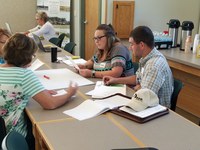Leadership, Nutrition, Food Safety Programs Benefit Agriculture
(Click the image below to view a high-resolution image that can be downloaded)
Finding enough people to serve on local agriculture-related boards and committees can be challenging.
North Dakota has more than 8,300 boards, councils and committees, among them crop improvement association, township officer, soil conservation, weed, water and commodity boards. That means one of every 24 residents over age 18 needs to serve in a leadership role.
To help North Dakotans develop the skills and confidence to serve effectively, North Dakota State University Extension family and community wellness specialists and agents developed Lead Local. It’s a one-day program that teaches aspiring, elected and appointed leaders about ethics, parliamentary procedure, different personality styles and conflict resolution.
This is exactly the training local leaders want and need, according to Carie Moore, who works for the Natural Resources Conservation Service in Cando. She attended Lead Local twice.
“We all know if you are on one board, you’re probably on a few others as well, so this training impacts many boards just through a single person,” she says.
“All organizations need to step up if they want people to get and stay involved,” she adds. “This course gave a lot of the groundwork for those new to boards and for the existing boards on what to do for new and recruiting members.”
Moore is among nearly 275 people from 726 North Dakota organizations, many of them agriculture-related, who have attended Lead Local. Several report that their boards now save an hour of meeting time because the meetings run more efficiently.
If all 726 organizations saved an hour a month, the yearly savings would total $215,099 (based on the value of volunteer time calculated by Independent Sector, which brings together nonprofits, foundations and corporations to strengthen their ability to fulfill their missions).
Related Extension family and community wellness programs that benefit agriculture include:
- Youth Lead Local - a Lead Local version for junior and senior high students
- Building Tomorrow’s Leaders - helps ninth- and 10th-graders get involved civically, build skills and confidence to lead, and develop personal and professional networks
- North Dakota Soil and Water Conservation Leadership Academy - helps participants develop skills to lead soil conservation, watershed and community-based projects that protect water quality for future generations
- Rural Leadership North Dakota (RLND) - an 18-month leadership development program
The Soil and Water Conservation Leadership Academy was an eye-opener for Corey Bittner, West McLean Soil Conservation District manager, and the district’s board members.
“Very beneficial for our board was the part of the training where they went over Robert’s Rules of Order and how to run a functional and efficient meeting,” Bittner says. “We also learned how to recognize where there are problems occurring and how to approach producers on a potential problem that they could help with fixing.”
Of the 168 people who have participated in RLND since it started in 2003, 36 percent were from the agriculture sector, 20 have run for office and three were elected to state-level positions, including state senator. RLND participants also have used their leadership skills to initiate projects such as farm and ranch agritourism operations, and events, activities and blogs to educate youth and adults about North Dakota agriculture.
“RLND was a real-world experience that I learned from and utilize every day,” says Dickinson-area rancher and RLND Class VI alumnus Will Meyer.
Building Tomorrow’s Leaders was a huge success in Cavalier County, according to Macine Lukach, an Extension agent there. Three months after 24 students from four schools completed the program, nearly half reported taking on a leadership role in an organization they belonged to and said they plan to seek an elected position in their organization’s next election.
Annie’s Project is another key Extension program. It’s a six-week course that empowers women to be better business partners on the farm or ranch.
“Annie’s Project brings women together to learn from experts in production, financial management, human resources, marketing and the legal field,” says Crystal Schaunaman, an Extension agent in McIntosh County and state Annie’s Project coordinator. “There’s plenty of time for questions, sharing, reacting and connecting with presenters and fellow participants. It’s a relaxed, fun and dynamic way to learn, grow and meet other North Dakota farm/ranch women.”
Tori Gross, who farms with her husband in Emmons County, feels that because of the program, she’ll be able to take over the operation’s record-keeping and marketing responsibilities. She is one of more than 1,000 women from 35-plus counties who have completed the program.
Other ways Extension supports the state’s agricultural sector are family and community wellness programs and resources such as:
- Design Your Succession Plan, (www.ag.ndsu.edu/succession) which helps farm and ranch families transition their operation to the next generation
- Field to Fork (www.ag.ndsu.edu/fieldtofork) webinars and food preservation, preparation and safety programs with science-based education that combats misinformation about dietary fads and food safety issues, which can impact producers’ livelihood
- A website with resources to deal with farm stress during difficult financial times (www.ag.ndsu.edu/farmranchstress)
- Food Entrepreneurship (www.ag.ndsu.edu/food/food-entrepreneurship), North Dakota Local Foods (www.ag.ndsu.edu/food/local-foods), and community and organizational facilitation assistance to help agricultural entrepreneurs develop a business plan, and grow and find markets for their products
- Healthwise for Guys (www.ag.ndsu.edu/healthwiseforguys), Nourish and Exercise Your Body (www.ag.ndsu.edu/nourishyourbody), sun safety and diabetes prevention programs to reduce the risk of chronic diseases and lower obesity rates in rural areas, where medical services are more limited
NDSU Agriculture Communication - Oct. 15, 2018
| Source: | Lynette Flage, 701-231-7782, lynette.flage@ndsu.edu |
|---|---|
| Editor: | Ellen Crawford, 701-231-5391, ellen.crawford@ndsu.edu |


